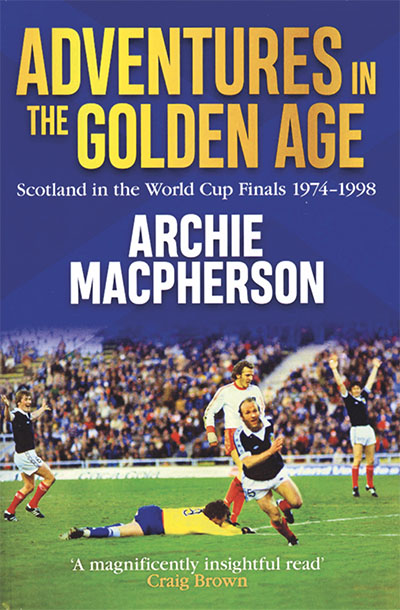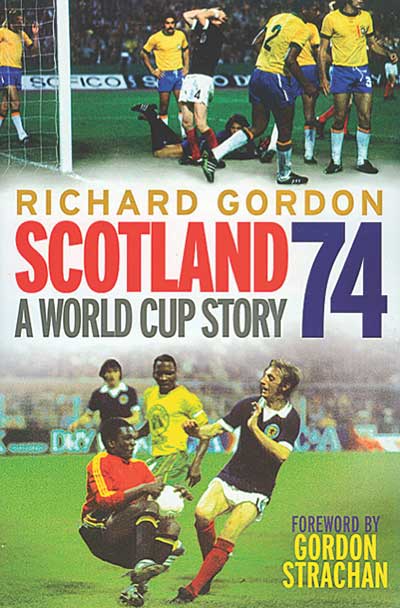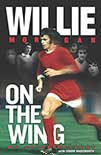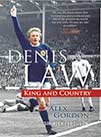
Scotland in the World Cup finals 1974-1998
Black and White, £11.99
Reviewed by Alan Patullo
From WSC 379, September 2018
Buy the book

Scotland in the World Cup finals 1974-1998
Black and White, £11.99
Reviewed by Alan Patullo
From WSC 379, September 2018
Buy the book
2 August ~ “I’ll be pleasantly surprised if we make the play-offs,” said Wigan fan Ian Aspinall ahead of the 2015-16 League One season, after pointing to their high turnover of players, untried manager and the League’s youngest chairman. Ian must have been amazed, then, when his team were promoted as champions come May, top scorers in the league thanks in large part to the form of Will Grigg. It won’t as come as much of a shock to the other League One contributors, however, who had Wigan down as runners-up.
 A World Cup story
A World Cup story
by Richard Gordon
Black and White, £11.99
Reviewed by Archie MacGregor
From WSC 332 October 2014
With yet another World Cup having passed Scotland by, the fondness and esteem with which the squad led by Willie Ormond to the finals in West Germany all of 40 years ago are regarded seems to grow ever warmer. Not without some justification either, as although they were unable to progress beyond a group featuring holders Brazil, Yugoslavia and Zaire, they emerged unbeaten, something not even West Germany as eventual winners could lay claim to. Nothing captured this particular glorious failure more enduringly than the image of Billy Bremner clutching his head in his hands as he came within a bobbled ricochet of earning the Scots what would have been a dream-like, yet arguably deserved, victory over the Brazilians.
As nostalgia trips go it makes for an engaging story and Richard Gordon, the respected voice of BBC Radio Scotland’s football coverage for many years, covers it in sure-footed and enjoyable fashion, relying heavily on a mix of interviews with surviving members of Ormond’s 22-man squad and contemporary press coverage. Perhaps the most remarkable aspect of the entire 1974 campaign from qualification to its agonising denouement in the final match against Yugoslavia is just how shambolic Scotland’s preparations had been on and off the field. While it was nothing compared the apocalyptic meltdown that was to come along four years later under Ally MacLeod in Argentina, this Scottish side and their entourage pretty much lived up to something of a Spinal Tap equivalent of the worst stereotypical behaviour of footballers on tour.
Most notorious was the Jimmy Johnstone “lost at sea” rowing boat incident at the squad’s Largs training base for the Home Internationals. But this was just one ill-starred tale among many of broken curfews, boozing, disputes over commercial deals and rumours of team selections being not solely the preserve of the manager. Ironically it was probably Johnstone who had more reason than anyone to emerge with a sense of grievance from the maelstrom, as having apparently been forgiven by Ormond for his boating misdemeanour and yet another breach of discipline prior to a warm-up game in Oslo, he did not feature in any of the three group matches despite still being near the peak of his powers.
While saluting Scotland’s valiant playing endeavours the theme of self-destruction just keeps on recurring. Depending on who you believe, the players either had a misplaced sense that victory alone over Zaire in the opening game was sufficient or they wanted to conserve their energy for the big one against Brazil. Either way it never looked like being enough, but there was to be a final unkind twist as their fate was sealed by an unfortunate fumble by Zairian goalkeeper Robert Kazadi which gifted the Brazilians a decisive third goal in the final round of group matches.
As the book reminds us there was however to be one lasting consolation for the players – uniquely among all of Scotland’s squads to have participated in a World Cup finals they actually got a welcoming party when they arrived back at Glasgow airport.
 by Willie Morgan with Simon Wadsworth
by Willie Morgan with Simon Wadsworth
Trinity Mirror, £16.99
Reviewed by Graham McColl
From WSC 326 April 2014
If the purpose of this book were to rid Willie Morgan of the image of being George Best’s doppelganger, it sets about it in a strange fashion. Behind the main picture on the cover, faint background images show Morgan at various stages of his life from babe to footballer but, inexplicably, the only other person amid these images is Best, Morgan’s late 1960s and early 1970s fellow winger at Manchester United. On the inside back flap, there is a picture of Morgan in a United strip… along with Best. Inside the book there is only one advertisement for another publication – a page-sized promotion for The Best of Best, a “souvenir magazine” from the Daily Mirror that boasts “lost images” of “The Genius As You’ve Never Seen Him Before”.
George is given further prominence once the story begins, receiving a mention on more than 40 pages. Yet in Bestie, George’s own 1998 authorised biography, Morgan features only twice, both times derogatorily. “Morgan always seemed a bit jealous,” Georgie says. Morgan, in contrast, on first mention of Best, says, touchingly, that their lives would be “intertwined”.
Pushing this book on the back of Best, as someone has decided to do, is unnecessary. Morgan is an engaging storyteller, a happy-go-lucky individual with an underlying toughness forged, as he relates in excellent detail, through his upbringing in Sauchie, the Clackmannanshire mining village. He is also capable of some fabulous self-promotion: “Along with Geroge Best [who else?], I was one of the two biggest stars in football,” he says of mid-1968 – the era of Eusébio, Bobby Charlton, Bobby Moore, Jimmy Johnstone, Pelé, Denis Law et al.
One early inconsistency almost brings the tale to a shuddering halt, though. Willie states that his dad, after a theological dispute with a Canon Matthews in Sauchie when Willie was around 12, had “wanted to kill” Matthews, and never went to church again. Yet, when Willie turns 15, his dad keeps him on at school, on the advice of a priest, rather than sending him down the pit, because: “My dad was never one to go against the wishes of the church.” This seeming inconsistency is more than a pedantic niggle. If Willie goes down the mine, he doesn’t play schools football, doesn’t get spotted by Burnley FC, doesn’t become a pro footballer, doesn’t write this book.
Get over that hurdle and the book lives up to the breathless cover blurb of “hundreds of tales” about “the hell-raising Best [him again] and a host of others”, although the story of Scotland’s 1974 World Cup is shockingly light on insider detail. Things peter out with post-playing tales of socialising with people such as Rod Stewart which does at least bring some amusement, with a schoolboyishly eager Stewart asking Willie, as they attend a match, to relate each stage of his own pre-match professional routine. “I would probably be picking some horses out right now for the next race,” Morgan replies. His yarn is like that all the way through and plentifully enjoyable for it.
 King and country
King and country
by Alex Gordon
Arena, £17.99
Reviewed by Archie MacGregor
From WSC 323 January 2014
It’s easy to understand why Denis Law was, and still is, idolised by so many Scotland fans. As this chronicle of his international career reminds us, he just loved pulling on the navy blue jersey. There’s a palpable sense that he was just as excited and proud about his last cap – in Scotland’s opening 1974 World Cup group match against Zaire – as he was when he made his debut against Wales in 1958.
He could play a bit too, which helped of course. Law remains, alongside Kenny Dalglish, his country’s record goalscorer with 30 to his name. Twice he scored four goals in a game and he put a few in the back of the net against England. No doubting the iconic status of “the Lawman” then, but the trouble is this book just about goes right off the scale with the adulation. Superlatives are served up by the trowel – there’s just about a different one for every goal that Law scored in his entire senior career and he got 325 of them. So it’s not only the constant references to games from the Home Internationals and Scotland appearing in World Cup finals that evoke a bygone age. In an era where the warts-and-all biography laden with tales of compulsive behaviour disorders and dysfunctional relationships within dressing rooms is now the accepted norm you are left craving more gritty insight.
While the idiosyncratic Aberdonian seems nothing other than a down-to-earth type there are still a few aspects of his international career that would surely have justified some considered scrutiny. It’s widely accepted that spanning the 1960s the Scotland team, blessed with talents such as Law, Jim Baxter, Jimmy Johnstone and others, underperformed by quite a margin in World Cup and European Championship qualifiers, failing to reach the finals of either between 1958 and 1974. Just how much did the obsession with giving the English a right doing, personified by Law, distort and distract the national side’s focus?
Even when Law was part of the squad that was taken to the 1974 finals there was a fair bit of hullabaloo about his inclusion which is only lightly dwelt upon here. It’s pointed out that then manager Willie Ormond robustly defended the decision – however the fact that he was immediately dropped after the Zaire opener is surely a pointer that this was an issue worthy of more thoughtful examination. The trials and frustrations that Law faced with his lengthy injury woes and loss of form from 1967 onwards is another facet barely touched on.
Still, if as a kid like me you went around parading the trademark clenched cuff salute every time you scored a goal in the playground, there is probably more than enough here for you to enjoy wallowing in the nostalgia. It’s just a shame we don’t learn as much about Law the enigma as Law the legend.